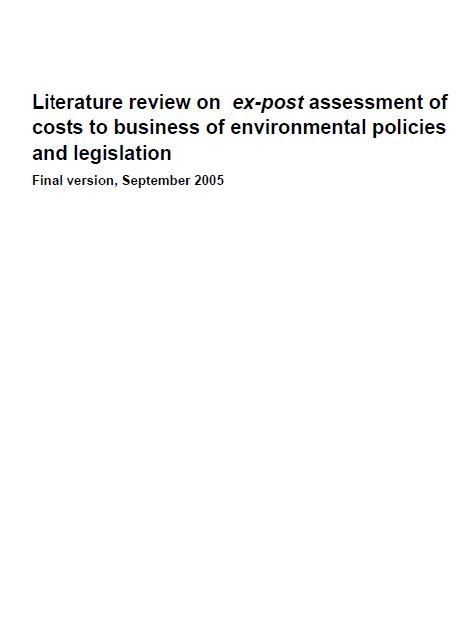The compliance cost that environmental regulation imposes on businesses plays a central role in the debate on economic competitiveness and environmental sustainability. However, on closer inspection these costs often turn out to be lower than originally anticipated. As part of a a European consortium, Ecologic reviewed ex-post analyses of the costs imposed on business because of European environmental legislation, and compared these to ex-ante estimates. The project reports conclude that some ex-ante overestimation is inevitable, and that the new EU regulatory flexibility could make accurate predictions even more difficult. But it nevertheless proposes a series of ways in which accuracy could be improved.
Objectives
Only few studies had systematically evaluated the efficiency and the cost-effectiveness of environmental policies from an ex-post perspective. In particular, it was unclear whether the real compliance costs that environmental policies impose on firms have been as high as previously estimated, or whether they have been higher or lower. Against this background the project’s objective was to provide ex-post estimates of compliance costs to business of selected pieces of EU environmental legislation, and to compare these to the ex-ante estimates if possible.
Methodology
A comparison of ex-ante and ex-post estimates needs to consider some methodological caveats: for example, the real costs of a measure will depend on the way that a policy is actually implemented, which is often not foreseeable at the stage of policy formulation. Costs may be lowered through technological development – which is unknown at the time that the regulation is passed, and is often triggered through the regulation. In addition, the real costs are likely to be affected by a number of external factors such as price and wage changes, general economic conditions etc. Also, the regulator is faced with asymmetrical information: affected economic sectors have an incentive to come up with high ex-ante estimates of the expected compliance costs of environmental legislation, in order to prevent legal measures altogether or to lobby for exemptions, transitional support etc.
The project team, consisting of eight institutions in five different countries, reviewed the available literature and conducted six case studies of European environmental Directives (Large Combustion Plants, Integrated Pollution Prevention and Control, Ozone depleting substances, Car emissions, Packaging and Packaging waste and the Nitrates Directive). Ecologic contributed the literature review.
Results
Accuracy of ex-ante estimates could be improved as follows:
- Cost estimates should draw on as many sources as possible.
- As green policies become more flexible, cost estimates should be updated frequently. "Feedback loops" should be set up to update cost predictions in light of experience.
- This could eventually lead to "rules of thumb" for factoring as yet unknown technological innovation, economies of scale and "learning curve effects" into initial cost estimates.
- It should be mandatory to analyse actual, as well as predicted, costs of policies so comparisons can be made and lessons learned. Before and after comparisons must compare like with like.
- Sensitivity analyses should be used to identify the parameters most likely to influence costs. A better understanding of business behaviour and likely responses to policy is also urged.
- Finally, costs must be clearly defined and should always include avoided costs such as lower energy usage.





